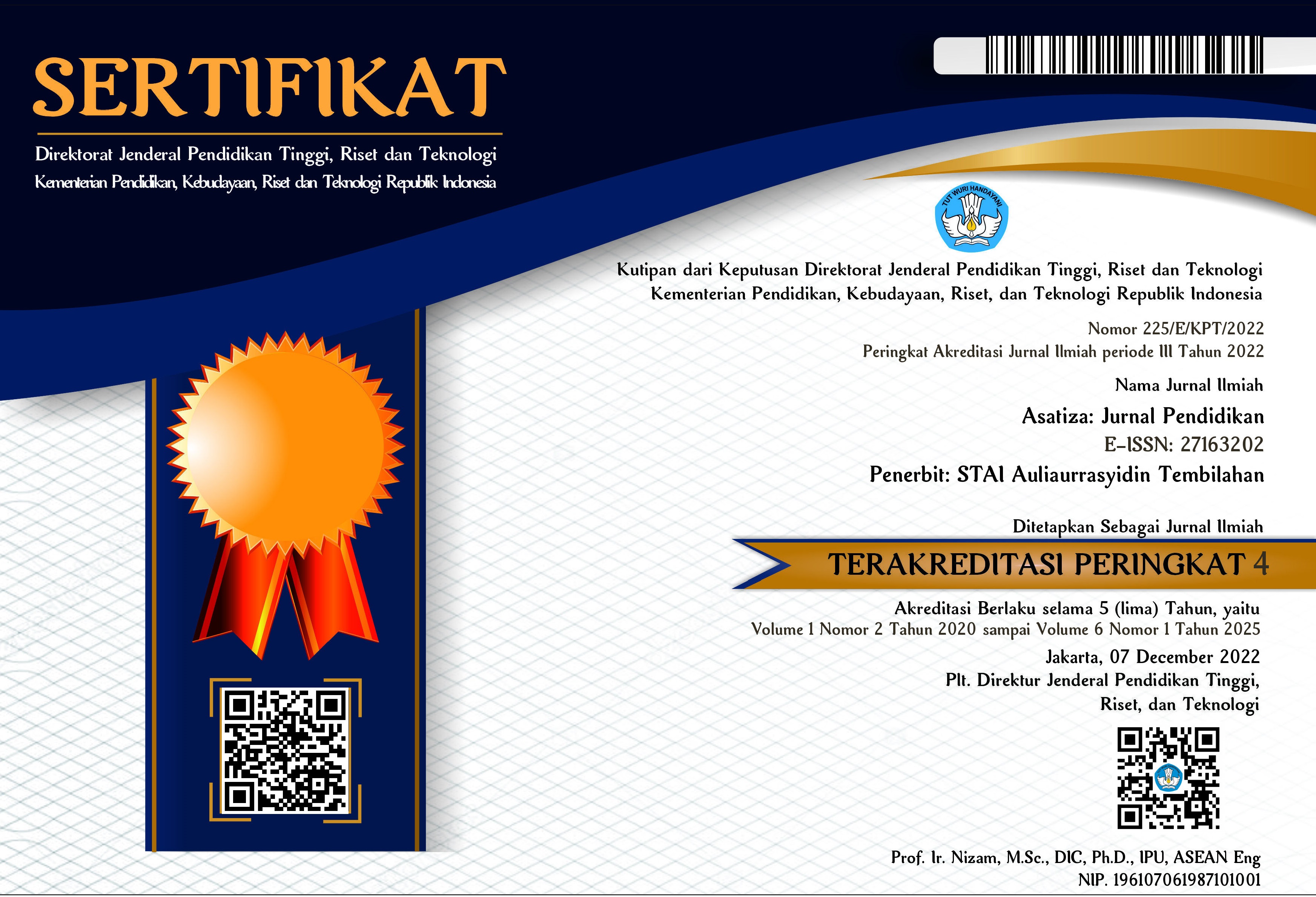Kesiapan Siswa SMP Negeri 2 Siberut Utara dalam Menghadapi Asesmen Nasional Berbasis Komputer
DOI:
https://doi.org/10.46963/asatiza.v3i1.422Keywords:
Student’s readiness, Computer-Based, National Assessment, GovernmentAbstract
The Computer-Based National Assessment (ANBK) is a government program that aims to map the education quality of primary and secondary school in Indonesia. The purpose of this study was to find out: (1) a description of the student’s readiness in facing the ANBK, (2) what factors were the obstacles for student in preparation for ANBK. This type of research is qualitative research with a case study approach regarding the student’s readiness Utara in facing ANBK. Preparations made by students in facing ANBK include participating in the socialization carried out by teachers who serve as proctors and technicians. Then students participating in computer use training accompanied by teachers which are carried out after school. During this training the teacher provides motivational support to students to stay motivated, enthusiastic, and not worried in facing ANBK There are several obstacles to students' readiness to face ANBK, namely students have low technological literacy, limited available computer equipment, limited power sources as a resource for using computer equipment, and limited internet networks causing students to not be able to participate in simulations on the ANBK website. Although accompanied by obstacles during the preparation process, students have good readiness to participate in the implementation of ANBK, this can be proven by the implementation of ANBK well.
Downloads
References
Artharina, F. P., Handayani, D. E., & Kurniawan, W. (2020). Sosialisasi implementasi kurikulum 2013 di kelompok kerja guru kecamatan tahunan Kabupaten Jepara. Jurnal Pendidikan dan Pengabdian Masyarakat, 3(2), 122-125. https://jurnalfkip.unram.ac.id/index.php/JPPM/article/view/1882
Chendrasari, W. O., Natalia, C., & Inderawati, W. (2019). Pendampingan persiapan ujian nasional berbasis komputer (UNBK) Mtss Nurul Huda, Desa Sampora, Banten. Jurnal Bakti Masyarakat Indonesia, 2(1), 155-161. http://dx.doi.org/10.24912/jbmi.v2i1.4340
https://puspendik.kemdikbud.go.id/. (2021).
Imron, I. F., Mujiwati, E. S., Permana, E. P., & Laila, A. (2021). Sosialisasi pendampingan belajar anak pada masa pandemi untuk kelas rendah di SDIT Bina Insani Kediri. Dedikasi Nusantara: Jurnal Pengabdian Masyarakat Pendidikan Dasar, 1(1), 10-17. https://doi.org/10.29407/dedikasi%20.v1i1.16074
Jana, P., & Rahmawan, A. D. (2019). Pendampingan persiapan ujian nasional berbasis komputer pada siswa SMA Muhammadiyah 3 Yogyakarta (Computer Based National Exam Guidance For The Students Of Muhammadiyah 3 Senior High School Yogyakarta). Jurnal Berdaya Mandiri, 1(1), 84-89. https://doi.org/10.31316/jbm.v1i1.298
Maulida, K., & Wirdanengsih, W. (2019). Upaya yang dilakukan sekolah di daerah terpencil menghadapi kebijakan UNBK. Jurnal Perspektif, 2(3), 243-250. http://dx.doi.org/10.24036/perspektif.v2i3.96
Mukminina, M., & Abidin, Z. (2020). Coping kecemasan siswa SMA dalam menghadapi ujian tulis berbasis komputer (UTBK) tahun 2019. Jurnal Al-Azhar Indonesia Seri Humaniora, 5(3), 110-116. http://dx.doi.org/10.36722/sh.v5i3.384
Pakpahan, R. (2016). Model ujian nasional berbasis komputer: manfaat dan tantangan. Jurnal Pendidikan Dan Kebudayaan, 1(1), 19-35. https://doi.org/10.24832/jpnk.v1i1.225
Pebriyani, U., Sandayanti, V., Pramesti, W., & Safira, N. (2020). Dukungan sosial dengan tingkat kecemasan siswa dalam menghadapi ujian akhir nasional. Jurnal Ilmiah Kesehatan Sandi Husada , 9(1), 78-85. https://doi.org/10.35816/jiskh.v11i1.221
Reski, D. J. (2019). Konsep kesiapan siswa dalam mengerjakan tugas. SCHOULID: Indonesian Journal of School Counseling, 4(1), 33-38. https://doi.org/10.23916/08419011
Rudiansyah. R, Amirullah, A., & Yunus, M. (2016). Upaya Guru dalam mengatasi kecemasan siswa dalam menghadapi tes (Pencapaian Hasil Belajar) siswa di SMP Negeri 3 Banda Aceh. Jurnal Ilmiah Mahasiswa Pendidikan Kewarganegaraan Unsyiah, 1(1), 96-109. Nomor 1:96-109. http://www.jim.unsyiah.ac.id/pendidikan-kewarganegaraan/article/view/464
Sekar, G., Purnomo, A., & Wiradimadja, A. (2021). Kesiapan Belajar jarak jauh siswa SMP di Kota Malang. J-PIPS (Jurnal Pendidikan Ilmu Pengetahuan Sosial), 7(2), 81-92. https://doi.org/10.18860/jpips.v7i2.11669
Siahaan, S. (2018). Perintisan model pembelajaran terintegrasi TIK di daerah terdepan, terluar, tertinggal, dan perbatasan. TEKNODIK Journal (Educational Technology), 22(2), 171-185. https://doi.org/10.32550/teknodik.v0i0.459
Sugiyono. (2012). Metode Penelitian Bisnis. Bandung: CV. Alfabeta.
Downloads
Published
Issue
Section
License
Authors who publish with this journal agree to the following terms:
1. Copyright on any article is retained by the author(s).
2. The author grants the journal, right of first publication with the work simultaneously licensed under a Creative Commons Attribution shareAlike 4.0 International License that allows others to share the work with an acknowledgment of the work’s authorship and initial publication in this journal.
3. Authors are able to enter into separate, additional contractual arrangements for the non-exclusive distribution of the journal’s published version of the work (e.g., post it to an institutional repository or publish it in a book), with an acknowledgment of its initial publication in this journal.
4. Authors are permitted and encouraged to post their work online (e.g., in institutional repositories or on their website) prior to and during the submission process, as it can lead to productive exchanges, as well as earlier and greater citation of published work.
5. The article and any associated published material is distributed under the Creative Commons Attribution-ShareAlike 4.0 International License











2.png)



